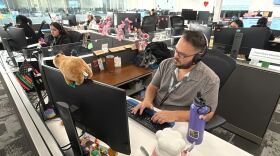President Obama joined a group of hard-hat construction workers in Ohio on Friday to break ground on a road improvement project funded by economic stimulus money. It's one of many public works the administration plans to spotlight in the coming weeks, during what the White House is calling "Recovery Summer."
The groundbreaking near Nationwide Children's Hospital in downtown Columbus marked the beginning of the 10,0000th road improvement project funded by the stimulus. Obama said pouring all that concrete and widening all those lanes has created a lot of needed jobs -- both directly and indirectly.
"They've put thousands of construction crews, just like this one, to work," he said. "They've spurred countless small businesses to hire -- because, you know, these are some big guys here, so they've got to eat. Which means that you've got to get some food brought in or the local restaurants here benefit from the crews being here at work."
But with national unemployment still at 9.7 percent, and Ohio's jobless rate even higher, the president acknowledged many more jobs are needed. This summer, the nature of stimulus spending will shift away from preserving jobs in state and local government toward more public works. There will be six times as many highway projects as last summer. Eight times as many national parks projects. And 20 times as many water projects.
"Instead of worrying about where their next paycheck is going to come from, Americans across the country are helping to build our future. And their own futures," he said.
But pollster Michael Dimock of the Pew Research Center says the administration has a political problem: Americans don't believe all that asphalt the government is paying for is putting us on the road to recovery.
'Totally Understandable'
"The public doesn't feel we've turned the corner yet. They're still pretty gloomy about the state of the economy," Dimock says. "And they're skeptical that the stimulus plan passed last year has really made much of a difference."
In a Pew survey this month, more people said they think the president's policies are hurting the economy than said his policies are making it better. The largest group thinks the policies haven't made much difference.
In fact, many independent economists say the stimulus has helped to revive the economy and prevent even bigger job losses. But Vice President Biden, who oversees the government program, says it's "totally understandable" that many Americans don't see it that way.
"It's real simple," Biden says. "The measurement is: Is it feeling better? Am I more confident? Can I go, instead of getting my hair cut every seven weeks, can I go back to getting it done once a month or once every three weeks? Can I take a vacation? Am I going to buy this car? Do I feel better I'm going to be able to make my mortgage payment?"
A Double-Edged Sword
The administration is planning a high-visibility campaign this summer to promote stimulus projects, with more televised groundbreakings and a lot of Recovery Act logos posted along freeways and in national parks. Dimock cautions the "Recovery Summer" campaign could be a double-edged sword.
"Seeing those signs may remind people the government is taking steps to try to help the economy and provide jobs," he says. "But it also reminds people the government is spending a lot of money. And that's not so popular right now."
Indeed, concern about government spending is so strong the Senate was unable to muster the votes this week to extend unemployment benefits.
The government doesn't have a lot of time to change people's attitudes about the economy. Recovery Summer will be closely followed by Midterm Election Autumn.
Copyright 2022 NPR. To see more, visit https://www.npr.org. 9(MDAzMjM2NDYzMDEyMzc1Njk5NjAxNzY3OQ001))







